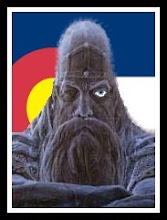
Silence
Two of my favorite bloggers, Amy(http://amykane.typepad.com/blog/) and Brigid(http://mausersandmuffins.blogspot.com/) have stirred up some long held recollections on silence. Brigid in particular, wrote on the silence encountered while stand hunting. And that write brought up the following:
We stopped on an open rise to drink water. The thud of my racing heart slowed and I realized that there was no other sound. New snow muffled any echoes. Erie silence, nothing moved, no breeze. That silence, it seeped into my being. It would have been cold were it not for the brilliant sun pouring out radiation, burning through thin air.
As the sun worked on the snow, pine and spruce boughs released their burden of new powder. Those small, muffled small avalanches were the only sound to rise.
And I wondered how the Ute Indians and solitary trappers survived in these mountains during those long, silent winters.
And that, beloved, stirred up these memories:
Kit Carson, the famous scout, trapper, trader and early political figure in Northern New Mexico spent at least two winters in the St. Vrain River drainage, north and west of modern college town of Boulder, Colorado. In 1840 he built a rough cabin on a outcrop ledge of granite, facing more or less south by south-east. The remnants of the fireplace can still be seen on that ledge and the mountain that bears the name, Cabin Mountain.
I grew up fishing on the creek that was also named for Kit Carson’s winter home; Cabin Creek.
The header on the advertisement read something like this:
“ Luring Pines Cabins, Meeker Park Colorado – Bob and Mary Anne James, proprietors.”
They were my great aunt and uncle. They purchased the cabins in 1949 and rented them out every summer until they retired in 1972.
Some of my most coveted memories are of the early years. Those years where the cantankerous pump house chuffed and rattled on the creek. It provided an outdoor, cold water spigot for all of the eight cabins. Each of them had one electric light and one small true "icebox" and a great cast iron cookstove. Those were all the modern conveniences available. There was a double shower house up the hill. "Thunderbuckets" were kept under each bed. Each morning they were emptied in one of the four double-holer outhouses that sat off to the off side of the creek drainage.
Over the next five years, improvements were made. Dad and Uncle Bob ran real plumbing to each cabin. Harry "Doc" Sutherland brought in his backhoe and cat. He dug the hole for a double chamber septic tank and leach field, and ran the sewer lines from each cabin. The county gave a grant from the Feds to upgrade the electrical service. Refrigerators were installed. My uncle Pete and his Dad “Buzz” built a lodge addition to the main cabin. “Doc” Sutherland built a massive native stone fireplace at the far end. The lodge became the office and gathering place for all and sundry to read, play cards or work puzzles on rainy days.
It was an evening luxury to stretch out on the day bed in the den as the quick summer heat rose off the roof and our caramel toasted skin. We kids would dose off as Dad and Uncle Bob listened to the Denver Bears playing baseball 90 miles away down in the sweltering city.
On most weekend mornings, my grandmother would wake me just before dawn. In the flint cold half light, we would eat a bit of toast and drink some tea, maybe some orange juice and sneak out the back door. Outside, our fishing poles and an old spade waited.
We hiked down a steep trail, down into the dew laden hemlock and alder, aspen and willow next to the creek bed. There we dug for worms. The rich black, mica and sand laden soil yielded sleepy cold earthworms...bait for trout.
The next few hours would find us silently plying deep honey holes, undercut banks along open gravel ripples and the deep rock bound sweeps of Cabin Creek. It wasn't "sport" fishing. We were hunting for meat.
We would come up the hill at lunch, clean our catch, eat and take a quick nap in the soft afternoon. Sometimes hikes or a truck ride high on the hillside to gather deadfall for firewood would preclude the afternoon fishing. But most days we would return as the sun began to set, seeking the lunkers who came out to feed as the light in the canyon dimmed.
Time meant little. We were ruled by the moving sun. Clocks were merely a nuisance. One phone serviced all eight cabins. And supper left us sleepy, ready for the deep feather beds with crisp white sheets and heavy Pendleton wool blankets. There was a deep and profound peace most nights, broken only by the sound of the wandering breeze whispering in pines or the distant screech of hunting owls, or the errant coyote calling to its pack.
Sh-h-h-h-h-h-h...I can still hear the silence when the well house pump grumbled to a halt, the giant philco radio's tubes darkened, its hum no longer worrying, and the icebox motor realized that it was damn near as cold outside as it wanted to be inside.
That was silence.
The only sound was the echo of starlight bouncing off the Aspen and Ponderosa...and the soft distant laughter of Cabin Creek as she danced down the canyon, splashing her bright skirts in the moonlight. She was happy to know us, to share her life and bounty with us in those quiet summers so distant now.
That was silence, that was true peace.
~~~~~~~~~
We were cross-country skiing in mid-February up the James Creek trail, across from Winter Park. It was the day after a big snow. There were no others in the virgin white landscape. My ex wife and I moved in that slow glide, taking our time up the winding incline. The only sounds were the rhythmic swish...swish of the skis cutting through blue-white powder, the creak of shoe leather against wire bindings and the rush of air in and out of lungs, gulping for oxygen in the thin, cold air at 9'000 ft. The creek was covered over with ice and snow, its voice silenced. Squirrels and rabbits hibernated in cozy dens. Crows, the only noticeable birds, circled in the lower canyons. The land up this high slumbered.We stopped on an open rise to drink water. The thud of my racing heart slowed and I realized that there was no other sound. New snow muffled any echoes. Erie silence, nothing moved, no breeze. That silence, it seeped into my being. It would have been cold were it not for the brilliant sun pouring out radiation, burning through thin air.
As the sun worked on the snow, pine and spruce boughs released their burden of new powder. Those small, muffled small avalanches were the only sound to rise.
And I wondered how the Ute Indians and solitary trappers survived in these mountains during those long, silent winters.
And that, beloved, stirred up these memories:
Kit Carson, the famous scout, trapper, trader and early political figure in Northern New Mexico spent at least two winters in the St. Vrain River drainage, north and west of modern college town of Boulder, Colorado. In 1840 he built a rough cabin on a outcrop ledge of granite, facing more or less south by south-east. The remnants of the fireplace can still be seen on that ledge and the mountain that bears the name, Cabin Mountain.
I grew up fishing on the creek that was also named for Kit Carson’s winter home; Cabin Creek.
The header on the advertisement read something like this:
“ Luring Pines Cabins, Meeker Park Colorado – Bob and Mary Anne James, proprietors.”
They were my great aunt and uncle. They purchased the cabins in 1949 and rented them out every summer until they retired in 1972.
Some of my most coveted memories are of the early years. Those years where the cantankerous pump house chuffed and rattled on the creek. It provided an outdoor, cold water spigot for all of the eight cabins. Each of them had one electric light and one small true "icebox" and a great cast iron cookstove. Those were all the modern conveniences available. There was a double shower house up the hill. "Thunderbuckets" were kept under each bed. Each morning they were emptied in one of the four double-holer outhouses that sat off to the off side of the creek drainage.
Over the next five years, improvements were made. Dad and Uncle Bob ran real plumbing to each cabin. Harry "Doc" Sutherland brought in his backhoe and cat. He dug the hole for a double chamber septic tank and leach field, and ran the sewer lines from each cabin. The county gave a grant from the Feds to upgrade the electrical service. Refrigerators were installed. My uncle Pete and his Dad “Buzz” built a lodge addition to the main cabin. “Doc” Sutherland built a massive native stone fireplace at the far end. The lodge became the office and gathering place for all and sundry to read, play cards or work puzzles on rainy days.
It was an evening luxury to stretch out on the day bed in the den as the quick summer heat rose off the roof and our caramel toasted skin. We kids would dose off as Dad and Uncle Bob listened to the Denver Bears playing baseball 90 miles away down in the sweltering city.
On most weekend mornings, my grandmother would wake me just before dawn. In the flint cold half light, we would eat a bit of toast and drink some tea, maybe some orange juice and sneak out the back door. Outside, our fishing poles and an old spade waited.
We hiked down a steep trail, down into the dew laden hemlock and alder, aspen and willow next to the creek bed. There we dug for worms. The rich black, mica and sand laden soil yielded sleepy cold earthworms...bait for trout.
The next few hours would find us silently plying deep honey holes, undercut banks along open gravel ripples and the deep rock bound sweeps of Cabin Creek. It wasn't "sport" fishing. We were hunting for meat.
We would come up the hill at lunch, clean our catch, eat and take a quick nap in the soft afternoon. Sometimes hikes or a truck ride high on the hillside to gather deadfall for firewood would preclude the afternoon fishing. But most days we would return as the sun began to set, seeking the lunkers who came out to feed as the light in the canyon dimmed.
Time meant little. We were ruled by the moving sun. Clocks were merely a nuisance. One phone serviced all eight cabins. And supper left us sleepy, ready for the deep feather beds with crisp white sheets and heavy Pendleton wool blankets. There was a deep and profound peace most nights, broken only by the sound of the wandering breeze whispering in pines or the distant screech of hunting owls, or the errant coyote calling to its pack.
Sh-h-h-h-h-h-h...I can still hear the silence when the well house pump grumbled to a halt, the giant philco radio's tubes darkened, its hum no longer worrying, and the icebox motor realized that it was damn near as cold outside as it wanted to be inside.
That was silence.
The only sound was the echo of starlight bouncing off the Aspen and Ponderosa...and the soft distant laughter of Cabin Creek as she danced down the canyon, splashing her bright skirts in the moonlight. She was happy to know us, to share her life and bounty with us in those quiet summers so distant now.
That was silence, that was true peace.



